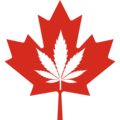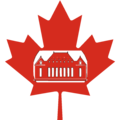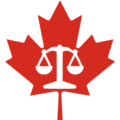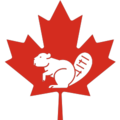Portal:Canada
| Showcase | Contents | Contributing |
Introduction
Canada is a country in North America. Its ten provinces and three territories extend from the Atlantic Ocean to the Pacific Ocean and northward into the Arctic Ocean, making it the world's second-largest country by total area, with the world's longest coastline. Its border with the United States is the world's longest international land border. The country is characterized by a wide range of both meteorologic and geological regions. With a population of just over 41 million people, it has widely varying population densities, with the majority residing in urban areas and large areas of the country being sparsely populated. Canada's capital is Ottawa and its three largest metropolitan areas are Toronto, Montreal, and Vancouver.
A developed country, Canada has a high nominal per capita income globally and its advanced economy ranks among the largest in the world by nominal GDP, relying chiefly upon its abundant natural resources and well-developed international trade networks. Recognized as a middle power, Canada's support for multilateralism and internationalism has been closely related to its foreign relations policies of peacekeeping and aid for developing countries. Canada promotes its domestically shared values through participation in multiple international organizations and forums. (Full article...)
Featured article -

The 1937 Social Credit backbenchers' revolt took place from March to June 1937 in the Canadian province of Alberta. It was a rebellion against Premier William Aberhart by a group of backbench (not part of the cabinet) members of the Legislative Assembly (MLAs) from his Social Credit League. The dissidents were unhappy with Aberhart's failure to provide Albertans with CA$25 monthly dividends through social credit as he had promised before his 1935 election. When the government's 1937 budget made no move to implement the dividends, many MLAs revolted openly and threatened to defeat the government in a confidence vote. (Full article...)
Current events
- May 1, 2025 – 2025 Southwest United States measles outbreak
- North America's three largest measles outbreaks continue to expand, with over 2,500 confirmed cases. There have been three fatalities in the United States and one in Mexico. The outbreaks began in Ontario, Canada, then surged in Texas and New Mexico, and have quickly escalated in Chihuahua, Mexico. (AP News)
- April 28, 2025 – 2025 Canadian federal election
- Voters in Canada go to the polls to elect the 343 members of the House of Commons to the 45th Canadian Parliament. (BBC)
- The Liberal Party under leader Mark Carney is projected to form government for the party's fourth consecutive mandate, with Carney remaining prime minister. (The Globe and Mail)
- Conservative Party leader Pierre Poilievre and New Democratic Party leader Jagmeet Singh lose their seats, with the NDP also losing official party status in the House. Each make speeches conceding the election, with Singh announcing his intention to resign as party leader. (CTV News)
- April 27, 2025 – 2025 Vancouver car attack
- The death toll from yesterday's vehicle-ramming attack at a street festival in Vancouver, British Columbia, Canada, rises to eleven with at least 20 others injured, making the attack tied for the deadliest vehicle-ramming attack in Canadian history. The British Columbia Prosecution Service charges the perpetrator with eight counts of second-degree murder, while investigators also rule out terrorism. (CTV News) (AP)
- April 26, 2025 – 2025 Vancouver car attack
- Nine people are killed and several others injured, after a car is driven through a crowd at a Philippine-Canadian festival in Vancouver, British Columbia, Canada. (Al Jazeera)
Selected panorama -
National symbol -
The coat of arms of Canada, also known as the Royal Coat of Arms of Canada or, formally, as the Arms of His Majesty The King in Right of Canada is the arms of dominion of the Canadian monarch and, thus, also the official coat of arms of Canada. In use since 1921, it is closely modelled after the royal coat of arms of the United Kingdom, with French and distinctive Canadian elements replacing or added to those derived from the British version. (Full article...)
Selected vital article -
The music of Canada reflects the diverse influences that have shaped the country. Indigenous Peoples, the Irish, British, and the French have all made unique contributions to the musical heritage of Canada. The music has also subsequently been influenced by American culture because of the proximity between the two countries. Since French explorer Samuel de Champlain arrived in 1605 and established the first permanent French settlements at Port Royal and Québec in 1608, the country has produced its own composers, musicians and ensembles. (Full article...)
Selected picture -
Featured biography -

Arthur Albert Irwin (February 14, 1858 – July 16, 1921), nicknamed "Doc", "Sandy", "Cutrate" or "Foxy", was a Canadian-American shortstop and manager in Major League Baseball (MLB) during the late nineteenth century. He played regularly in the major leagues for eleven years, spending two of those seasons as a player-manager. He played on the 1884 Providence Grays team which won the first interleague series to decide the world champions of baseball. Irwin then served as a major league manager for several years. (Full article...)
Did you know -

- ... that jazz singer Judi Singh's mother and father were, respectively, among the earliest Black and Sikh settlers of Alberta, Canada?
- ... that the parasitic fossil fungus Paleoserenomyces allenbyensis was named after a Canadian ghost town?
- ... that the Canadian government implemented the Peasant Farm Policy to force First Nations farmers to use the methods of European peasants?
- ... that in 1858, when 400 Black Americans experiencing discrimination in California resettled on Vancouver Island, clergyman Edward Cridge integrated Christ Church to welcome them?
- ... that the Canada Centre Building has one of the first aquifer thermal energy storage systems?
- ... that the United States won the 2023 CONCACAF Nations League final and extended a home unbeaten streak against Canada that dates back to 1957?
- ... that there's a Little Canada on Minnesota State Highway 36?
Featured list -
The Tip O'Neill Award is given annually to a Canadian baseball player who is "judged to have excelled in individual achievement and team contribution while adhering to the highest ideals of the game of baseball." The award was created by the Canadian Baseball Hall of Fame and first presented in 1984. It is named after James "Tip" O'Neill, one of the earliest Canadian stars in Major League Baseball (MLB). (Full article...)
Main articles
Associated Wikimedia
The following Wikimedia Foundation sister projects provide more on this subject:
-
Commons
Free media repository -
Wikibooks
Free textbooks and manuals -
Wikidata
Free knowledge base -
Wikinews
Free-content news -
Wikiquote
Collection of quotations -
Wikisource
Free-content library -
Wikiversity
Free learning tools -
Wikivoyage
Free travel guide -
Wiktionary
Dictionary and thesaurus




























